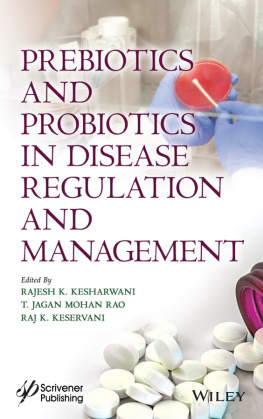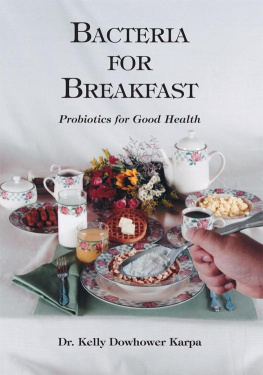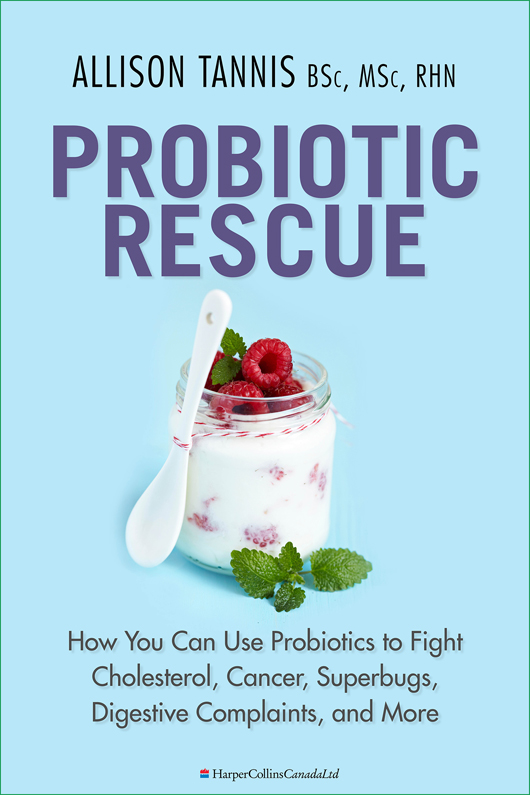Probiotic Rescue
How You Can Use Probiotics to Fight Cholesterol, Cancer, Suberbugs, Digestive Complaints and More
Allison Tannis, MSc., RHN
For Mimia woman who inspires us all to make a difference
A MICROSCOPIC VIEW OF THIS CHAPTER
Both good and bad microbes live in your body.
Bad microbes can cause illness.
Probiotics are good microbes that live in your body.
Probiotics inhibit the growth of bad microbes.
Probiotics assist with digestion, nutrient absorption and vitamin production.
Probiotics affect the health of the immune system.
Different probiotics have different effects on your health.
The key to a healthy microflora is to maintain a healthy population of a diversity of good microorganisms.
If you tend to be squeamish you may not want to know that your intestinal tract is home to one hundred trillion (1014) microorganisms. Microorganisms are bacteria and yeasts that are not visible to the human eye. In fact, microorganisms are all around you. They are in the water you drink, the food you eat and the air you breathe. Dont worryabout 95% of microorganisms are good for you. Microorganisms, sometimes called microbes, include bacteria, viruses, fungi, yeasts, algae and protozoa.
The microorganisms that live in your intestines make up what is called the intestinal microflora. The intestinal microflora is made up of many types of bacteria, fungi and yeast. Knowing that bacteria are the chief cause of infectious diseases in humans, it can be hard to imagine that they also play a beneficial role in your body.
In your body there are more microbes than human cells.
In your body, there are over 400 different species of microbes, living in symbiosis with youtheir host. Bacteria can be found in your mouth, stomach, intestines and urogenital tract. Some bacteria found in your body are known to be beneficial to human health and are called probiotics . Meanwhile, the other bacteria in your body, which are harmful, are called pathogenic bacteria. Depending on the type of bacteria, there is a different effect on the body; bacteria can have healthy, e.g., immune-boosting, benefits or cause toxicological (poisoning) harm to the body. A careful balance is necessary for health. The growth of harmful microbes in your body can result in disease.
The 400 species of microbes living in your body are fighting for space. They want to live, thrive and reproduce in your intestinal tract, an environment that offers the ideal temperature, humidity and food sources. Who wins the battle for your intestinal tract? Your intestinal tract is a complex community of microbes. Do you have the right microbes in you?
Bacterial Basics
Bacteria are unicellular, e.g., one-cell, and may have spherical, rod-like or curved bodies. Bacteria are very small. On average, bacteria are about one micrometer long and half a micrometer in diameter. The bacteria cell is surrounded by a membrane that regulates the flow of materials in and out. Some species of bacteria are surrounded by a capsule which has many functions, including protecting the bacteria from drying. Many species of bacteria swim by means of flagella, hair-like structures whose whip-like lashing provides movement. NOTE: When applied to bacteria, the term growth refers to an increase in the size of a population rather than an increase in the size of an individual microorganism.
BAD AND GOOD MICROBES
Similar to many childhood tales, the intestinal tract is an ongoing battle between good and evil. There are two types of microbes in your body: the bad and the good. Bad microbes live in your intestines and normally do not cause any disease-like symptoms. Fungi, yeasts and bacteria all live in the body and can be classified as bad microbes. Two examples of bad microbes commonly found in the human body are the bacteria E. coli and the yeast Candida albicans. What favors the growth of these bad microbes? Bad microbes flourish in an alkaline environment. Many of them produce ammonia to change the pH of the intestinal tract to be more alkaline and thus enhance their ability to survive and flourish. Stress and diet can also influence the presence of these microbes. Keeping these bad microbes in control is vital to the bodys health.
There are also good microbes found in the body, called probiotics. Probiotics have a positive impact on the bodys health. They prefer a more acidic intestinal environment. Many of the probiotics are called lactic acid bacteria. They can secrete lactic acid into their environment, making it more acidic and thus more hospitable to them. Stress and diet can reduce the number of probiotics in the intestinal tract. Luckily, as most childhood tales of good versus evil end in a positive light, so does this story. In a healthy body the majority of the microflora in the intestines is good bacteria, also known as probiotics.
PROBIOTICS
What is a probiotic? The term probiotic originates from the ancient Greek words pro and biotica, meaning for life. In 2001, an Expert Consultation meeting arranged by the World Health Organization and the Food and Agriculture Organization of the United Nations created a now widely accepted definition for probiotics. They define the term probiotic as:
live microorganisms which when administered in adequate amounts confer a health benefit on the host.
Medically, probiotic is defined as microorganisms that positively affect the health of our body when administered in adequate amounts.
A probiotic offers a health benefit to the host. What are these health benefits? First, let us consider the microflora as a whole. The intestinal microflora has the metabolic activity potential equal to that of the liver, the most active organ in the body! As such, the microflora is sometimes referred to as the forgotten organ. Be kind to your intestinal microbes as they contribute greatly to your metabolism.
The intestinal microflora has the metabolic activity potential equal to that of the liver.
Of all the species in the microflora, those designated as probiotics are of most importance to your bodys health. Probiotics affect many aspects of the body including nutrient digestion and absorption, immunity and much more. Probiotics aid digestion by completing the breakdown of food that was not fully digested. A good example is the ability of certain strains of probiotics to help with the digestion of lactose in the small intestine. As well, probiotics strains found in the colon help with digestion of some forms of fiber. Probiotics also produce vitamins, including the particularly important B vitamins, which play a key role in energy metabolism.






